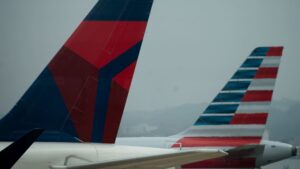Turbulent Skies: Airlines Slash Profit Forecasts Amid Economic Uncertainty
In a significant shift within the airline industry, several major carriers, including American Airlines and Delta Air Lines, are downgrading their profit and revenue expectations for the first quarter of the year. This alarming trend reflects a combination of weak economic performance and declining travel demand that is shaking investor confidence.
A Cautious Outlook from American Airlines
On Tuesday, ahead of the anticipated JPMorgan industry conference, American Airlines issued a stark warning to investors. The carrier now expects losses between 60 and 80 cents per share for the first quarter, a significant increase from their earlier forecasts of a potential loss ranging from 20 to 40 cents. In addition, revenue expectations have been revised downward, with American Airlines projecting flat revenues rather than the previously anticipated growth of up to 5%.
The airline attributed this sobering outlook to several factors, including the aftermath of a tragic incident involving one of its regional jets and an Army helicopter in Washington D.C., alongside a notable weak spot in domestic leisure travel particularly in March. Such incidents not only undermine consumer confidence but also raise questions about safety and reliability—crucial elements in the airline industry.
Delta’s Forecast: The Ripple Effect of Economic Instability
Delta Air Lines followed suit by slashing its own first-quarter estimates after the market closed on Monday. The airline has cited a "recent reduction in consumer and corporate confidence" due to heightened macroeconomic uncertainty as a driving force behind the decline in domestic demand. This decline is particularly troubling as it hints at broader economic issues affecting discretionary spending on travel.
Recognizing the precarious situation, Delta’s CEO Ed Bastian articulated that consumers are exercising caution, waiting to see how geopolitical events—such as trade tensions and government policies—will unfold. He noted a rising uncertainty in the market that is likely making consumers hesitant to commit to travel plans.
United Airlines and Beyond: A Shared Chorus of Concern
United Airlines is not immune to this trend. CEO Scott Kirby confirmed that the airline is also experiencing decreased demand, particularly in government travel, which constitutes about 2% of their business. However, Kirby is quick to point out that the impact extends further, affecting consultants and contractors—another 2% to 3% of United’s client base.
In response to these economic pressures, United has adopted stringent cost-saving measures, including the retirement of 21 aircraft. This decision, while difficult, reflects a proactive approach to mitigate the financial impact of necessary engine overhauls and operational costs.
Adjusting Strategies: The Road Ahead for Airlines
Not all responses to the crisis have been negative, however. Southwest Airlines recently adjusted its unit revenue guidance down to a growth of no more than 4%, down from 7% previously anticipated. In a surprising move that has drawn both praise and criticism, Southwest announced the end of its long-standing "two bags fly free" policy, which will begin charging for checked luggage starting this May—a bold strategy to enhance revenue amidst declines.
While cost-cutting measures may seem alarmingly pessimistic, both Delta and United executives remain optimistic about the long-term trends for travel. They point to sustained demand for long-haul international flights and premium travel segments as indicators that a recovery could be on the horizon once consumer confidence stabilizes.
Market Reactions: Investors Take Note
The stock market reflected the uncertain sentiment: Delta shares dipped over 8%, while American and United also saw declines of 6% and 4%, respectively. Conversely, JetBlue Airways saw modest gains, up roughly 5%, as some investors appear to view the airline’s performance more favorably amidst industry instability.
Conclusion: Navigating the Future
In these turbulent times, the airline industry is faced with significant headwinds driven by economic uncertainty and shifting consumer behavior. Companies that adopt innovative strategies and adapt to changing market dynamics will be the key players in weathering this storm. At Extreme Investor Network, we provide insights not only on market shifts but also on the strategic pivots that can help investors navigate these challenging waters.
As the landscape continues to evolve, staying informed and agile is crucial for both airlines and investors alike. Keep following our coverage for in-depth analysis that goes beyond the headlines and helps you make informed decisions in these unpredictable times.

